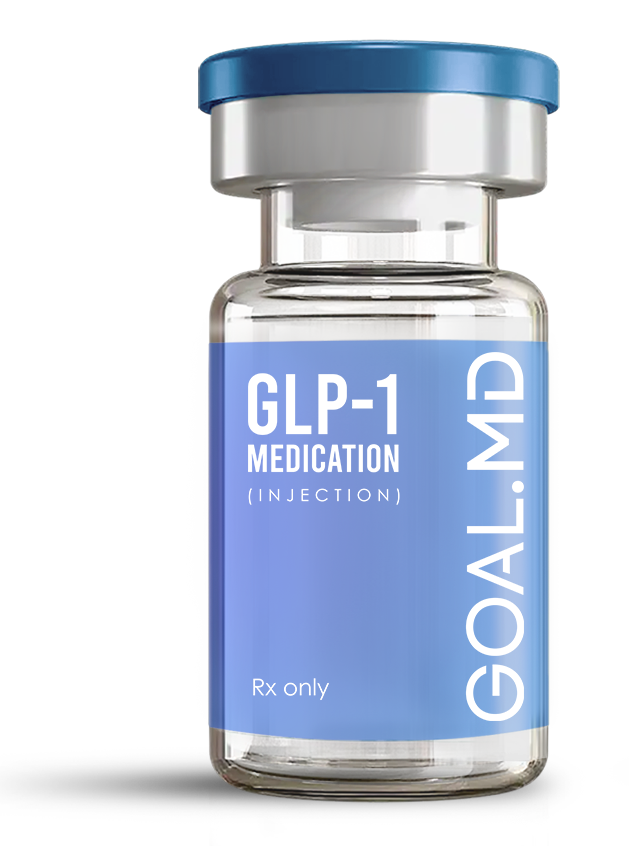
GOAL.MD Health & Wellness Blog
Evidence-based insights, medical weight loss information, and practical tips from our physicians and healthcare experts.

How Long Should You Stay on GLP-1s? Experts Weigh In
With blockbuster medications like Wegovy, Ozempic, and Mounjaro rewriting the rules of weight loss, one question is growing louder in clinics and comment sections alike:
How long should you stay on GLP-1 medications?
The answer isn’t one-size-fits-all. But based on current research, expert opinion, and real-world data, here’s what you need to know if you're on GLP-1s—or considering them.
Why This Question Matters
GLP-1 receptor agonists work. Clinical trials show average weight loss between 15% to 22% of body weight, depending on the drug and duration. But this success often leads to a follow-up question:
“Do I have to stay on this forever?”
The answer? Maybe. But not necessarily. Let’s break it down.
The 3 Phases of GLP-1 Use
Initial Titration (Weeks 1–8):
You’re ramping up the dose slowly to minimize nausea and side effects.
Active Weight Loss (Months 2–12):
Your appetite is reduced, food noise is quieted, and weight typically comes off steadily.
Maintenance or Discontinuation (Year 1+):
You’ve hit your goal—or are close—and need to decide whether to continue or taper off.
Why Some Experts Say: “Stay On It Long-Term”
GLP-1s don’t permanently reset your metabolism. Once you stop, your appetite hormones (ghrelin, leptin, and insulin sensitivity) often revert. Studies show many patients regain up to ⅔ of lost weight within a year of stopping.
That’s why obesity specialists compare GLP-1s to antihypertensives or antidepressants—medications that treat chronic conditions for the long haul.
"If the medication is well tolerated, and it's keeping the weight off, why stop?"
— Dr. Scott Kahan, MD, director of the National Center for Weight and Wellness
When It May Be OK to Stop
Stopping might make sense if:
You've reached a healthy, stable weight
You’ve made sustainable lifestyle changes
You’re seeing a provider who can taper your dose safely and slowly
You have an ongoing support system (nutrition, movement, therapy)
Still, many providers will recommend a lower maintenance dose over quitting cold turkey.
What Happens If You Stop Too Soon?
Some risks of early discontinuation include:
Food noise returning (those persistent cravings)
Appetite rebounding
Weight regain
Emotional eating or binge tendencies resurfacing
Metabolic markers worsening (glucose, insulin, cholesterol)
The transition off GLP-1s needs careful planning, especially if the root causes of obesity (stress eating, hormonal dysregulation, executive function issues) haven’t been addressed.
Mental Health: A Missing Piece
GLP-1s don’t just help with weight. For many, they improve emotional eating, reduce anxiety around food, and help with impulse control—especially in patients with ADHD or binge eating disorder (BED).
Discontinuing without a mental health plan can lead to relapse. That’s why many providers work alongside therapists or coaches to prepare patients for tapering.
So, How Long Should You Stay On?
There’s no magic number. But here’s a consensus-driven framework:
Less than 6 months → Likely too short. Not enough time to build new habits.
6–12 months → Effective for many, but needs close post-med monitoring.
12–24 months → Best results for long-term stability
Ongoing → Ideal for chronic appetite dysregulation or genetic obesity
Remember: Obesity is a chronic, relapsing disease. There’s no shame in long-term medication use—especially when it keeps you healthy.
Final Takeaway
Don’t think of GLP-1s as a “quick fix.” Think of them as a reset button for your brain and body—one that needs to be paired with nutrition, mindset work, and ongoing support.
Whether you stay on for 1 year or 5, the right timeline is the one that keeps you healthy, balanced, and in control—not overwhelmed or burned out.
Want Trusted Help With Your GLP-1 Plan?
Start or continue your journey safely with expert support from GOAL.MD. We offer customized plans, compounded options, and holistic coaching to help you lose weight and keep it off—for good.
Why GOAL.MD?
✅ Sourced from audited 503a US compounding pharmacies.
✅ Custom dosages adjusted to your needs.
✅ Free consultation + 24/7 support.

How It Works
1. Quiz
90 seconds. No commitment.
2. Consult
Video chat with your GOAL.MD doctor.
3. Deliver
Meds at your door tomorrow.
Transform Your Life with Physician-Directed Care
Join thousands who've found success with physician-directed care. Take our 3-minute quiz to see if medical weight loss is right for you.








